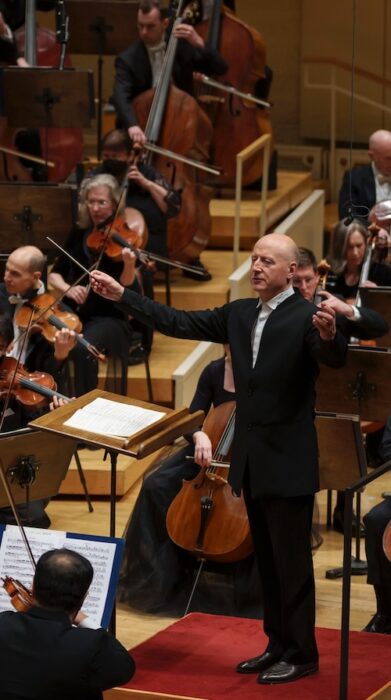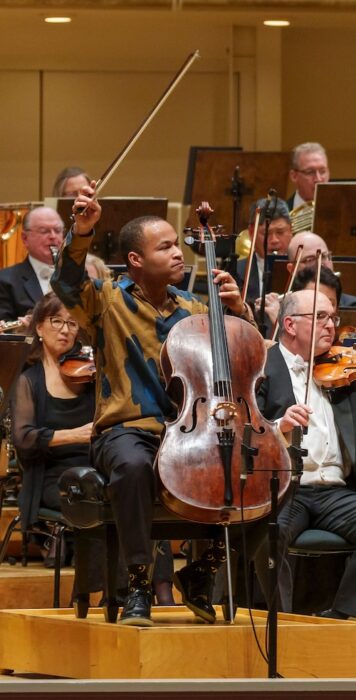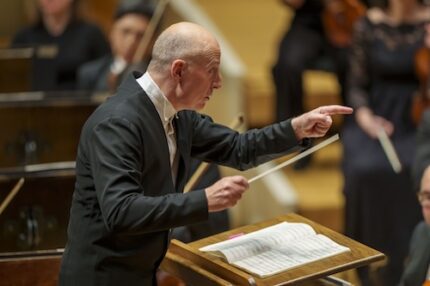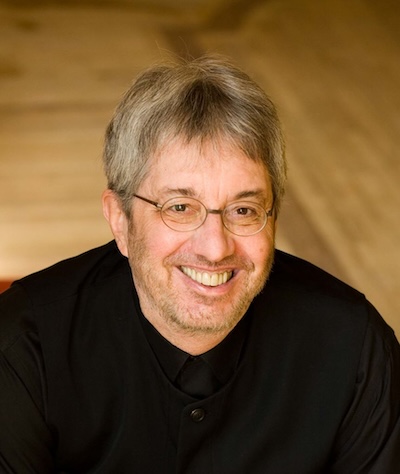Järvi makes a commanding CSO return as young cellist impresses in Elgar

What a difference a week makes.
Unlike the tired and rough-edged Chicago Symphony Orchestra concert heard last week, from the first notes of Beethoven’s Leonore Overture No. 3 Thursday night, the orchestra sounded refreshed, energized and vital under the precise and inspiring baton of Paavo Järvi.
The Estonian-American conductor has been a consistently excellent CSO podium guest and showed why once again, drawing fiery, committed and superb performances from the musicians throughout the evening’s program. Järvi is a conductor we need to hear more frequently in Chicago.
“This opera will earn me a martyr’s crown,” said Beethoven of his sole work in the genre, Fidelio. He continually revised Fidelio—originally titled Leonore—throughout his life, including writing four overtures for the opera.
Beethoven decided that the Leonore Overture No. 3 was too long and elaborate for a theatrical curtain-raiser but it makes a first-rate concert work as shown by Järvi and company Thursday night. For a piece as familiar as this, Järvi led a notably fresh, taut and crackling account that had a bristling immediacy and sense of theatrical greasepaint. The introduction, depicting Florestan in his prison cell, unfolded with atmospheric gloom, and the main Allegro had fizzing, cut-and-thrust drama. Mark Ridenour lofted a noble offstage trumpet solo and the final section went with a galvanic sense of triumphant exhilaration.
Edward Elgar’s Cello Concerto hasn’t been heard in a decade at CSO subscription concerts, and Thursday night’s performance proved worth the wait with the fast-rising Sheku Kanneh-Mason making an outstanding Orchestra Hall debut.
As the young British cellist of the moment, one would expect a worthy showing in his country’s most celebrated concert work for his instrument. And indeed the engaging Kanneh-Mason delivered a notably youthful and ardent performance of Elgar’s music.
For all its popularity, Elgar’s Cello Concerto is a challenging work to pull off successfully. Many soloists go for an overtly bravura style, which tends to overshadow the interior sadness that permeates this wartime score.

Kanneh-Mason had both qualities dexterously balanced throughout in his impassioned and eloquent performance. Playing his magnificent 1700 Gofriller instrument, the soloist’s febrile, burnished sound was a consistent pleasure to the ears. While he handled the solo virtuosity fluently—a couple pitchy moments apart—Kanneh-Mason also proved a sensitive advocate for the nostalgia at the heart of Elgar’s score. He imbued the Adagio with hushed, elegiac feeling and brought fine verve to the galumphing finale, ensuring the yearning reprise made its effect before the emphatic coda. Järvi supported the soloist with a full-blooded symphonic canvas befitting this Late Romantic score.
The ovations recalled Kanneh-Mason to the stage. He favored the audience with an encore of his own composition, Melody, the gentle theme given a plaintive, tender expression.
Carl Nielsen’s music often paints a world where order is continually upended by chaos and disorder. Nowhere is that more bracingly manifest than in the Danish composer’s Symphony No. 5, which concluded the evening.
Even more than in Elgar’s concerto—which was written during the First World War—Nielsen’s Fifth (1920-22) is music that seems haunted by the recent violence and carnage. That conflict is palpable in the first movement, where the uneasy landscape is fractured, dominated by outbursts of militaristic percussion. A rhapsodic theme for strings—Nielsen’s richest lyrical outpouring—is menaced and undermined by a malign, increasingly violent snare drum, though the heartening theme eventually triumphs.

Paavo Järvi is especially inspired in music of Northern and Eastern Europe and he directed a masterful, acutely concentrated account of Nielsen’s challenging score. The crucial woodwind writing emerged full and rounded, and the disparate elements and competing contrapuntal lines were scrupulously balanced, with Nielsen’s most hectic passages emerging clearly and effectively. Jarvi gave the lyrical theme sumptuous treatment and the malevolent snare drum—played by Cynthia Yeh with daunting power in its ad libitum attacks—was as jarring as it should be.
After the arresting first movement, the challenge in this score is ensuring that the second movement—made up of four shorter sections—doesn’t come off like an anticlimax. To his credit, Järvi maintained the intensity and anarchic energy to the double bar. In his dramatic sweep through the concluding movement, he pointed the contrasts, underlined the fugal writing and built to a resounding final peroration.
The musicians clearly enjoyed playing this music under Järvi and there were smiles aplenty from the string first desks in the whirling craziness of the final section. All sections contributed to this imposing performance with special kudos to Yeh’s drum work and Stephen Williamson’s expressive clarinet playing, especially his keening, otherworldly solo at the end of the first movement.
_________

Cliff Colnot, longtime conductor of the Civic Orchestra and the CSO’s MusicNOW series died Monday, age 76, after a long illness. Colnot was a fine musician and a clarifying exponent of even the knottiest contemporary scores.
The CSO has posted an appreciation by archivist Frank Villella here.
_________
The program will be repeated 7:30 p.m. Saturday and 3 p.m. Sunday. The Beethoven and Elgar works will be repeated with Smetana’s Die Moldau 7 p.m. Friday at the Apostolic Church of God, 6320 S. Dorchester Ave. cso.org
Posted in Uncategorized


Posted Feb 16, 2024 at 12:30 pm by Brad
Totally agree about this fantastic concert. Among the many highlights was a truly magical moment when Maestro had the orchestra at just the brink of audibility to accompany Mr. Williamson’s astonishing solo at the end of the Nielsen first movement. The audience was absolutely silent which contributed to the perfect atmosphere. Stunning.
Posted Feb 16, 2024 at 2:47 pm by GCMP
Brad is right. That was a stunning moment among many. The audience was really spell-bound. And no coughing!
Posted Feb 17, 2024 at 5:58 pm by Moselle Eugen
Paavo Järvi might be considered a middle-of-the-road choice for the next music director of the Chicago Symphony Orchestra. I suspect that he would prove to be an excellent one.
Posted Feb 18, 2024 at 2:31 am by Charles Amenta
I thought more of last week’s Beethoven (Seong Jin Cho’s big sonic presence endures in the memory) and a bit less of this week’s Elgar (with Weilerstein’s indelible performance from 2023’s Ravinia in mind).
But Järvi was top notch. The dynamic range he achieved with the CSO was miraculous. My only thought was that he could have dedicated the Leonora performance to the memory of Navalny. I heard it that way. May Navalny have an Egmont-like heroic afterglow in our remembrance!
If “Järvi is a conductor we need to hear more frequently in Chicago” is code for “music director candidate,” I certainly agree.
Posted Feb 18, 2024 at 8:50 pm by Jeff R
By far one of the best CSO performances this season. The Nielsen was riveting. The CSO meshed with Jarvi, it was obvious. He’s a strong candidate for next MD.